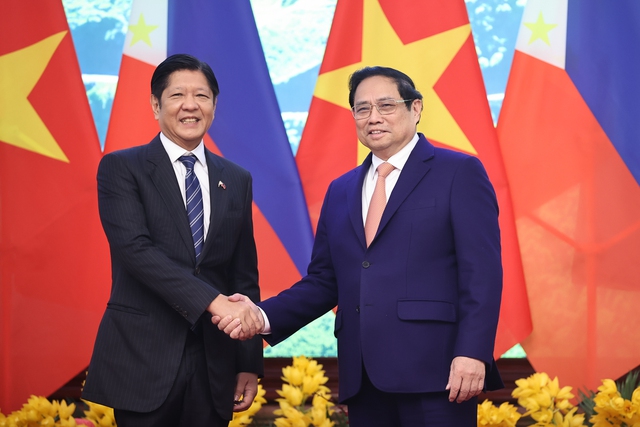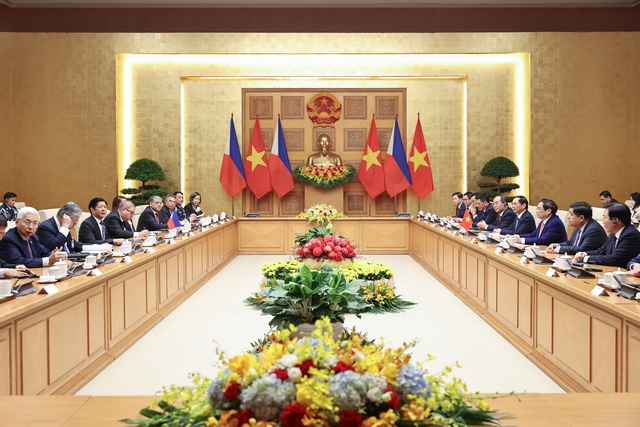Viet Nam, Philippines target to raise trade to US$10 bln by 2025
VGP - Prime Minister Pham Minh Chinh and Philippine President Ferdinand Romualdez Marcos Jr. pledged to raise the two-way trade value to US$10 billion by 2025 during their meeting held in Ha Noi on Tuesday.

Prime Minister Pham Minh Chinh (R) meets with Philippine President Ferdinand Romualdez Marcos Jr., in Ha Noi, January 30, 2024 - Photo: VGP
The summit meeting took place on the occasion of the Philippine President's State visit to Viet Nam from January 29-30.
Pham welcomed the Philippine President's first State visit to Viet Nam, saying it would help promote the friendship and multifaceted cooperation between the two nations.
Pham reiterated that rice trade is one of the crucial cooperation areas between the two sides, not only for economic benefits but also for food security, proposing both nations effectively implement the recently-inked memorandum of understanding on rice trade cooperation.
For his part, Marcos Jr. underscored that the Philippines always attaches importance to and expects to lift the bilateral ties to a new height.
He consented with the Vietnamese Prime Minister's proposals to step up collaboration in potential areas such as education-training, science-technology, tourism, culture, people-to-people links, and local-to-local exchanges, and to faciliate the opening of direct air routes between their localities.

To further strengthen the bilateral relations an intensive, practical and effective manner, they vowed to increase all-level delegation exchanges, utilize the bilateral cooperation mechanisms and comprehensively review the action plan to implement the strategic partnership for the 2019-2024 period and soon build a new action program in the new period.
They emphasized the need to give priority to boosting cooperation in potential areas such as digital transformation, green economic development, circular economy, climate change response, and energy transition.
The two nations should create favorable business and investment environment, and foster collaboration in areas of their advantages such as processing technology, infrastructure, auto supporting industry, renewable energy, and high-tech agriculture.
They affirmed to uphold the role of defense, security and maritime cooperation mechanism, resume the operation of the Viet Nam–Philippines Joint Commission on Maritime and Ocean Cooperation at the deputy-minister level, and improve the effectiveness of joint patrol, search and rescue at sea as well as foster collaboration in drug prevention and other crimes such as cybercrime, high-tech crime, and economic crime.
The two leaders spoke highly of their close coordination at international and regional forums such as ASEAN, UN, APEC, and ASEM.
They highlighted the significance of maintaining solidarity and the central role of ASEAN to buid a strong, united and self-reliant ASEAN Community.
Regarding the East Sea issue, both sides agreed to continue close coordination and work with other ASEAN Member States and partners to maintain and implement the common principled stance of the bloc on the East Sea issue; ensure full and strict implementation of the Declaration on the Conduct of Parties in the East Sea (DOC), accelerate negotiations on formulation of an efficient and effective Code of Conduct in the East Sea (COC) in line with international law, including the 1982 United Nations Convention on the Law of the Sea (UNCLOS 1982) in order to build the East Sea into a sea of peace, cooperation and development, contributing to stability, development, and prosperity in the region and the world./.
